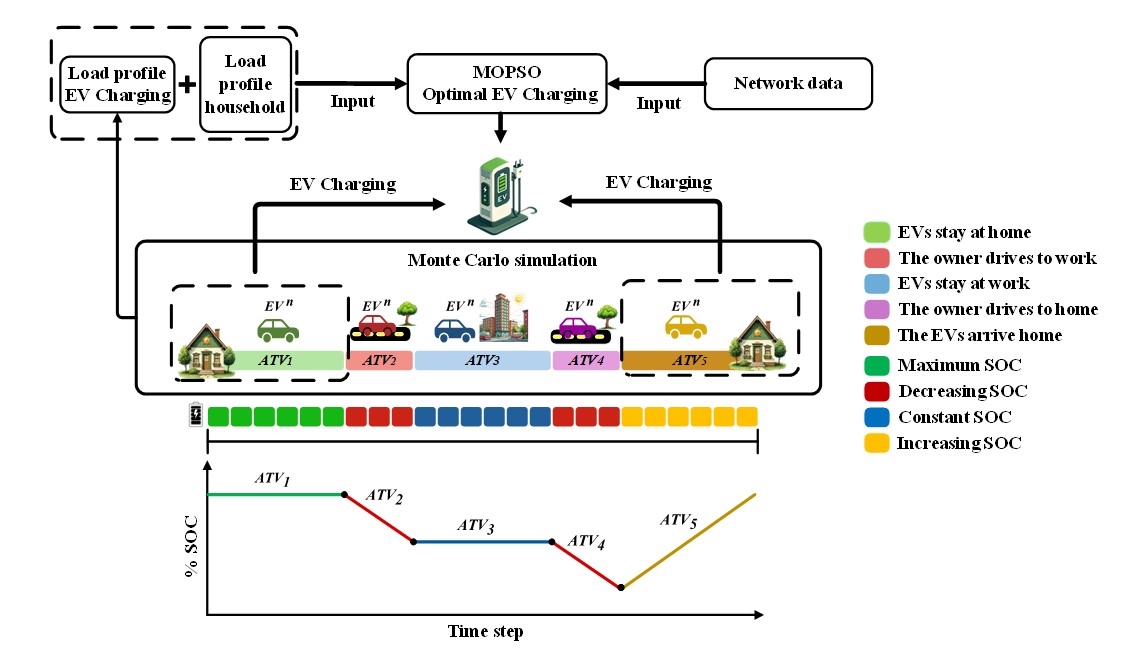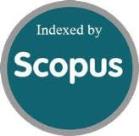Multi-Objective Optimization of EV Charging for Cost and Loss Minimization Under TOU Tariff
DOI:
https://doi.org/10.46604/aiti.2024.14520Keywords:
optimal EV charging (OEVC), multi-objective optimization (MOO), electricity cost minimization, energy loss minimization, time-of-use (TOU) tariffAbstract
This study proposes an optimal electric vehicle (EV) charging (OEVC) management methods to minimize electricity costs and energy losses in the distribution system, which arise from the growing demand for EV charging. a multi-objective particle swarm optimization (MOPSO) algorithm is used to solve the OEVC multi-objective optimization (MOO). Additionally, the time-of-use (TOU) tariff is used to coordinate between the distribution system operator and EV users, which can help increase the efficiency of the charging schedule. Monte Carlo Simulation (MCS) is used to model virtual EV user behavior and create EV charging load profiles. The proposed MOPSO-based OEVC approach is verified on the modified IEEE 33-bus distribution test system, using MATLAB software, under both uncontrolled and controlled charging case studies. The simulation results demonstrate that the proposed method optimizes EV charging efficiently, achieving reductions of approximately 7.60% in electricity costs and 28.73% in energy losses compared to the uncontrolled charging case.
References
Y. Ou, N. Kittner, S. Babaee, S. J. Smith, C. G. Nolte, and D. H. Loughlin, “Evaluating Long-Term Emission Impacts of Large-Scale Electric Vehicle Deployment in the US Using a Human-Earth Systems Model,” Applied Energy, vol. 300, article no. 117364, 2021.
C. Hofer, G. Jäger, and M. Füllsack, “Large Scale Simulation of CO2 Emissions Caused by Urban Car Traffic: An Agent-Based Network Approach,” Journal of Cleaner Production, vol. 183, pp. 1–10, 2018.
IEA, “Global EV Outlook 2024,” https://www.iea.org/reports/global-ev-outlook-2024, 2024.
H. Shareef, M. M. Islam, and A. Mohamed, “A Review of the Stage-of-the-Art Charging Technologies, Placement Methodologies, and Impacts of Electric Vehicles,” Renewable and Sustainable Energy Reviews, vol. 64, pp. 403–420, 2016.
R. Gunasekaran, M. B., A. S., P. K. Pareek, S. Gupta, and A. Shukla, “Prediction of Electric Vehicle Charging Demand Using Enhanced Gated Recurrent Units with RKOA Based Graph Convolutional Network,” Discover Applied Sciences, vol. 6, article no. 605, 2024.
J. Varga, G. R. Raidl, and S. Limmer, “Computational Methods for Scheduling the Charging and Assignment of an On-Site Shared Electric Vehicle Fleet,” IEEE Access, vol. 10, pp. 105786–105806, 2022.
H. Wang, M. Shi, P. Xie, C. S. Lai, K. Li, and Y. Jia, “Electric Vehicle Charging Scheduling Strategy for Supporting Load Flattening under Uncertain Electric Vehicle Departures,” Journal of Modern Power Systems and Clean Energy, vol. 11, no. 5, pp. 1634–1645, 2023.
B. Sun, Z. Huang, X. Tan, and D. H. K. Tsang, “Optimal Scheduling for Electric Vehicle Charging with Discrete Charging Levels in Distribution Grid,” IEEE Transactions on Smart Grid, vol. 9, no. 2, pp. 624–634, 2018.
M. Aurangzeb, A. Xin, S. Iqbal, S. Habib, M. U. Jan, H. U. Rehman, et al., “Decentralized Based Advance Optimized Scheduling Scheme to Charge and Discharge the Electric Vehicles,” Proceedings of 2022 5th International Conference on Energy Conservation and Efficiency, IEEE Press, pp. 1–7, 2022.
Y. Wan, D. Gebbran, R. K. Subroto, and T. Dragičević, “Optimal Day-Ahead Scheduling of Fast EV Charging Station with Multi-Stage Battery Degradation Model,” IEEE Transactions on Energy Conversion, vol. 39, no. 2, pp. 872–883, 2024.
G. Tsaousoglou, J. S. Giraldo, P. Pinson, and N. G. Paterakis, “Fair and Scalable Electric Vehicle Charging under Electrical Grid Constraints,” IEEE Transactions on Intelligent Transportation Systems, vol. 24, no. 12, pp. 15169–15177, 2023.
A. Tetuko, Subiyanto, and M. A. Malik, “An Optimal Energy Control System for Campus Microgrid Using Crow Search Algorithm Considering Economic Dispatch,” Advances in Technology Innovation, vol. 8, no. 4, pp. 303–312, 2023.
H. Zhang, X. Xu, J. Huang, and G. I. Rashed, “Optimal Scheduling Strategy for Multi-Type Electric Vehicle Charging Based on Improved GA,” Proceedings of 2024 6th International Conference on Energy Systems and Electrical Power, IEEE Press, pp. 1383–1386, 2024.
S. Techanok and K. Chayakulkheeree, “Optimal EV Charging Control for Distribution System Loss Minimization,” Proceedings of 2024 12th International Electrical Engineering Congress, IEEE Press, pp. 1–5, 2024.
Y. Wu, J. Zhang, A. Ravey, D. Chrenko, and A. Miraoui, “Real-Time Energy Management of Photovoltaic-Assisted Electric Vehicle Charging Station by Markov Decision Process,” Journal of Power Sources, vol. 476, article no. 228504, 2020.
Z. Liu, F. Wen, and G. Ledwich, “Optimal Siting and Sizing of Distributed Generators in Distribution Systems Considering Uncertainties,” IEEE Transactions on Power Delivery, vol. 26, no. 4, pp. 2541–2551, 2011.
T. M. Aljohani, A. F. Ebrahim, and O. A. Mohammed, “Dynamic Real-Time Pricing Mechanism for Electric Vehicles Charging Considering Optimal Microgrids Energy Management System,” IEEE Transactions on Industry Applications, vol. 57, no. 5, pp. 5372–5381, 2021.
M. M. Gamil, H. Masrur, K. M. Muttaqi, Y. Huang, M. E. Lotfy, and T. Senjyu, “Multi-Objective Optimal Power Scheduling of a Residential Microgrid Considering V2G and Demand Response Techniques,” Proceedings of 2022 IEEE Industry Applications Society Annual Meeting, IEEE press, pp. 1–5, 2022.
H. Yang, S. Yang, Y. Xu, E. Cao, M. Lai, and Z. Dong, “Electric Vehicle Route Optimization Considering Time-of-Use Electricity Price by Learnable Partheno-Genetic Algorithm,” IEEE Transactions on Smart Grid, vol. 6, no. 2, pp. 657–666, 2015.
Z. Huang, K. Wang, C. Cao, and Z. Mu, “Multi-Objective Optimal Power Flow Considering Small-Signal Stability Based on MOPSO,” Proceedings of 2022 4th International Conference on Electrical Engineering and Control Technologies, IEEE Press, pp. 419–423, 2022.
Maigha and M. L. Crow, “Electric Vehicle Scheduling Considering Co-Optimized Customer and System Objectives,” IEEE Transactions on Sustainable Energy, vol. 9, no. 1, pp. 410–419, 2018.
J. Chen, X. Huang, S. Tian, Y. Cao, B. Huang, X. Luo, et al., “Electric Vehicle Charging Schedule Considering User's Charging Selection from Economics,” IET Generation, Transmission & Distribution, vol. 13, no. 15, pp. 3388–3396, 2019.
S. Ahmadi, H. P. Arabani, D. A. Haghighi, J. M. Guerrero, Y. Ashgevari, and A. Akbarimajd, “Optimal Use of Vehicle-to-Grid Technology to Modify the Load Profile of the Distribution System,” Journal of Energy Storage, vol. 31, article no. 101627, 2020.
P. Grahn, “Electric Vehicle Charging Impact on Load Profile,” Ph.D. dissertation, School of Electrical Engineering, Royal Institute of Technology, Stockholm, Sweden, 2013.
M. Ghasemi, S. Ghavidel, M. Gitizadeh, and E. Akbari, “An Improved Teaching–Learning-Based Optimization Algorithm Using Lévy Mutation Strategy for Non-Smooth Optimal Power Flow,” International Journal of Electrical Power & Energy Systems, vol. 65, pp. 375–384, 2015.
C. A. C. Coello and M. S. Lechuga, “MOPSO: A Proposal for Multiple Objective Particle Swarm Optimization,” Proceedings of the 2002 Congress on Evolutionary Computation, IEEE Press, vol. 2, pp. 1051–1056, 2002.
J. Kennedy, “The Particle Swarm: Social Adaptation of Knowledge,” Proceedings of 1997 IEEE International Conference on Evolutionary Computation, IEEE Press, pp. 303–308, 1997.
S. Lalwani, S. Singhal, R. Kumar, and N. Gupta, “A Comprehensive Survey: Multi-Objective Particle Swarm Optimization (MOPSO) Algorithm: Variants and Applications,” Transactions on Combinatorics, vol. 2, no. 1, pp. 39–101, 2013.
D. Fioriti, G. Lutzemberger, D. Poli, P. Duenas-Martinez, and A. Micangeli, “Coupling Economic Multi-Objective Optimization and Multiple Design Options: A Business-Oriented Approach to Size an Off-Grid Hybrid Microgrid,” International Journal of Electrical Power & Energy Systems, vol. 127, article no. 106686, 2021.
F. M. Andersen, H. K. Jacobsen, and P. A. Gunkel, “Hourly Charging Profiles for Electric Vehicles and Their Effect on the Aggregated Consumption Profile in Denmark,” International Journal of Electrical Power & Energy Systems, vol. 130, article no. 106900, 2021.

Published
How to Cite
Issue
Section
License
Copyright (c) 2025 Suwimon Techanok, Keerati Chayakulkheeree

This work is licensed under a Creative Commons Attribution-NonCommercial 4.0 International License.
Submission of a manuscript implies: that the work described has not been published before that it is not under consideration for publication elsewhere; that if and when the manuscript is accepted for publication. Authors can retain copyright in their articles with no restrictions. is accepted for publication. Authors can retain copyright of their article with no restrictions.
Since Jan. 01, 2019, AITI will publish new articles with Creative Commons Attribution Non-Commercial License, under The Creative Commons Attribution Non-Commercial 4.0 International (CC BY-NC 4.0) License.
The Creative Commons Attribution Non-Commercial (CC-BY-NC) License permits use, distribution and reproduction in any medium, provided the original work is properly cited and is not used for commercial purposes.







